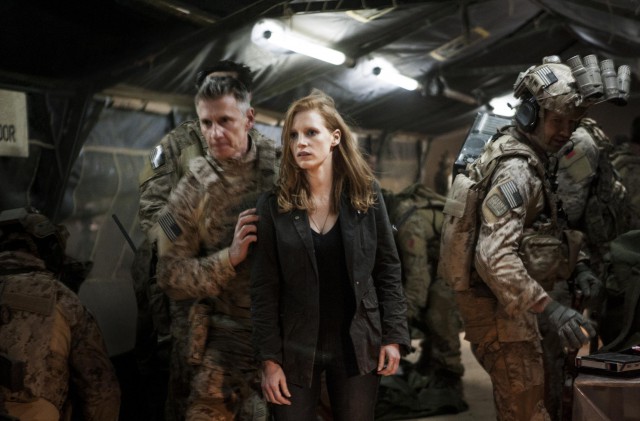
That members of the U.S. Senate have spent more time discussing the fictional depiction of torture in Zero Dark Thirty than they spent discussing the actual torture the military was performing in the wake of 9/11 is yet more proof that “Congress” is the opposite of “progress.” This isn’t to say that director Kathryn Bigelow and writer Mark Boal aren’t challenging our ethics. They are, and they found a cunning way to do it.
For a decade, Osama bin Laden was a national bogeyman, making Zero Dark Thirty as much Jaws as it is Black Hawk Down. The laborious, mostly narrative-free endeavor is a slow-motion examination of the line between determination and obsession and a reminder that stopping evil just may take evil, and we shouldn’t pretend otherwise.
The film opens with one of the most jarring sequences in memory, and not one image is displayed. The sounds of 9/11, the phone calls to loved ones, the television reports, the noise and confusion play out over a black screen. Because the film only works if we remember the bloodlust and anger America collectively felt, it’s a masterful way to refresh those feelings without exploiting the audience. It’s also the last truly breathtaking moment until the final sequence.
We meet Maya (Jessica Chastain) as she watches fellow intelligence agent Dan (Jason Clarke) torture the ever-lovin’ crap out of a man who is chained to the ceiling, waterboarded and forced to soil himself. She hates it. But she doesn’t leave. Watching Maya’s quest for answers over the next decade is exhausting, confusing and devoid of personality. Chastain was nominated for a Best Actress Oscar because she managed to squeeze a full character arc solely through body language and “oh-no-she-didn’t” sass. She bumps heads with her boss (Kyle Chandler), and doggedly pursues her theory regarding bin Laden’s message courier. Spoiler alert: Her hunch is right.
The last 40 minutes is the white-knuckle military raid promised in ads. It makes sense; how many would see a movie sold as “watch a woman relentlessly do research!” The mission is perfectly shot, exquisitely paced and clearly edited. And it is easy to feel the payoff for Maya, because it feels like we waited a decade for this moment too.
This film asks, “Was it worth it?” America tortured people. That’s a fact, even if we’re inclined to place it in a box on the cultural shelf right next to Native American genocide and slavery as things we all pretend to forget. Maya gradually learns to accept that torture is the most efficient way to do her job, a job that means saving and avenging lives. And the movie never sanitizes the torture, never glorifies it. The theory that somehow this film is a defense of such behaviors is reprehensibly stupid and should be dismissed outright. No, Bigelow and Boal want us to think on what we did, to remember that our “triumph” in killing the world’s greatest terrorist came at the expense of the world’s greatest moral authority. So, was it worth it?
Judging Zero Dark Thirty as a movie is hard. It feels more like an expensive ABC News reenactment and would make for a better documentary. The hubbub and praise it has received is understandable if somewhat hard to echo. In other words, the intelligence assessment here is “good, but not great.”
—This review first appeared in The Reader of Omaha, Neb.
Respond: [email protected]














